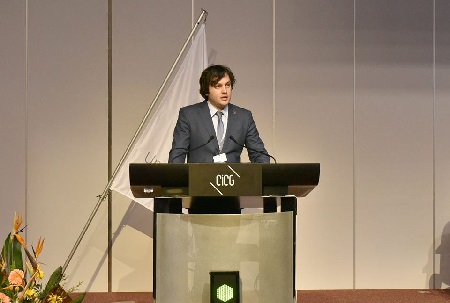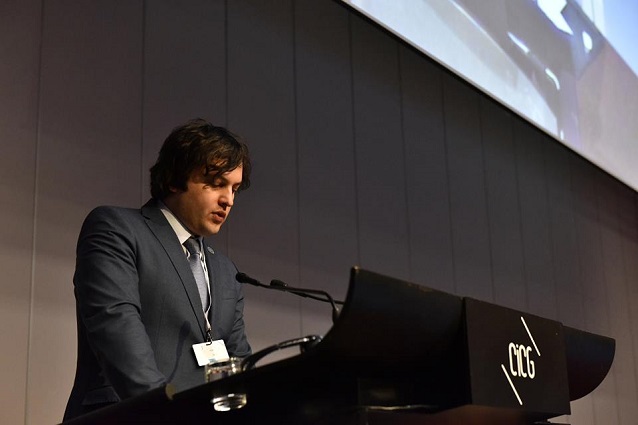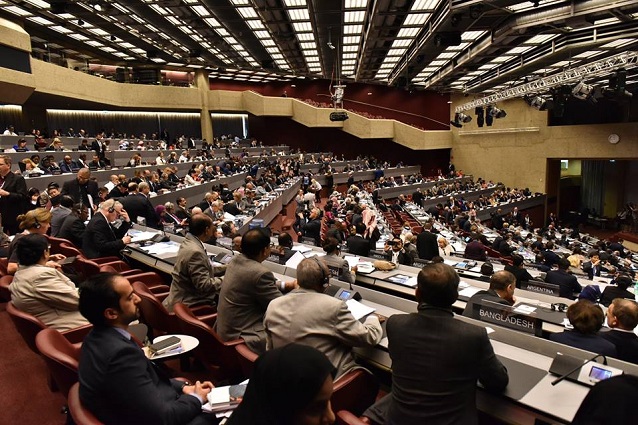Georgian Parliamentary Speaker: Russia committing numerous grave human rights violations

Georgian Parliamentary Speaker Irakli Kobakhidze has addressed the members of the 138th Assembly of the Inter-Parliamentary Union (IPU) in Geneva, Switzerland over issues concerning migrants and refugees.
IPU is a global organization of national parliaments, which works with parliaments to safeguard peace and drive positive democratic change through political dialogue and concrete action.

Irakli Kobakhidze speaks about the challenges migrants and refugees are facing nowadays. Photo by the Georgian Parliament's press office
Kobakhidze said the impact of the flow of refugees and internally displaced persons on national and regional stability and security is well known in Georgia.
For over 25 years, Georgia has been tackling the overwhelming problem of accommodating over 280,000 internally displaced persons who fled the conflict-ravaged parts of Georgia – Abkhazia and Tskhinvali region, or so-called South Ossetia", Kobakhidze said.
He said the first waves of Georgians and citizens of other ethnicities were expelled en masse as a result of ethnic cleansing after the Georgian government lost control of these territories in the early 1990s.
These territories were illegally and forcefully occupied by the Russian Federation after military aggression against sovereign Georgia in August 2008, increasing the numbers of internally displaced persons and refugees, and, at the same time, further aggravating the humanitarian and human rights situation inside the occupied territories”, he said.
Kobakhidze further spoke about the situation in the occupied regions. He said currently Russia occupies up to 20 percent of Georgia’s territory and illegally stations armed forces there maintaining the occupational regimes in both Abkhazia and Tskhinvali region.
And through these occupational regimes, Russia commits numerous grave violations of human rights – such as abduction and torture of peaceful citizens”, Kobakhidze said, giving the example of Archil Tatunashvili - a Georgian citizen who died in unclear circumstances in Tskhinvali over a month ago.
Kobakhidze said the restriction of freedom of movement of the local population and internally displaced persons from these regions and the inability of children to study in their native language is also the result of occupation.
Moreover, the Russian armed forces pursue a policy of so-called borderization, installing barbed wire fences that not only restrict the freedom of movement but also cause distressing and illegitimate separation of communities and, in some instances, even families”, Kobakhidze said.
He said both IDPs and the population that stayed in the occupied territories face serious challenges for survival and basic welfare, which creates insurmountable impediments for the return of IDPs and refugees to their homes, posing an imminent threat of a new wave of forced displacement.
According to Kobakhidze, this is happening despite numerous resolutions of the UN General Assembly, reaffirming the right of IDPs and refugees to return to home in safety and with dignity, reconfirming their property rights and unacceptability of forced demographic changes.

The 138th Assembly of the IPU on "Strengthening the Global Regime for Migrants and Refugees: The Need for Evidence-Based Policy Solutions" is taking place in Geneva, Switzerland on March 24-28. Photo by the Georgian Parliament's press office
He said despite the presence of hundreds of thousands of IDPs and refugees, Georgia admits thousands of international migrants (1,449 asylum seekers in 2015, 947 in 2016, and 951 in 2017).
Kobakhidze noted that Georgia has made numerous steps to support refugees and asylum-seekers and these institutional, normative and practical instructions have been positively assessed by EU, which has made Georgia a destination country.
 Tweet
Tweet  Share
Share